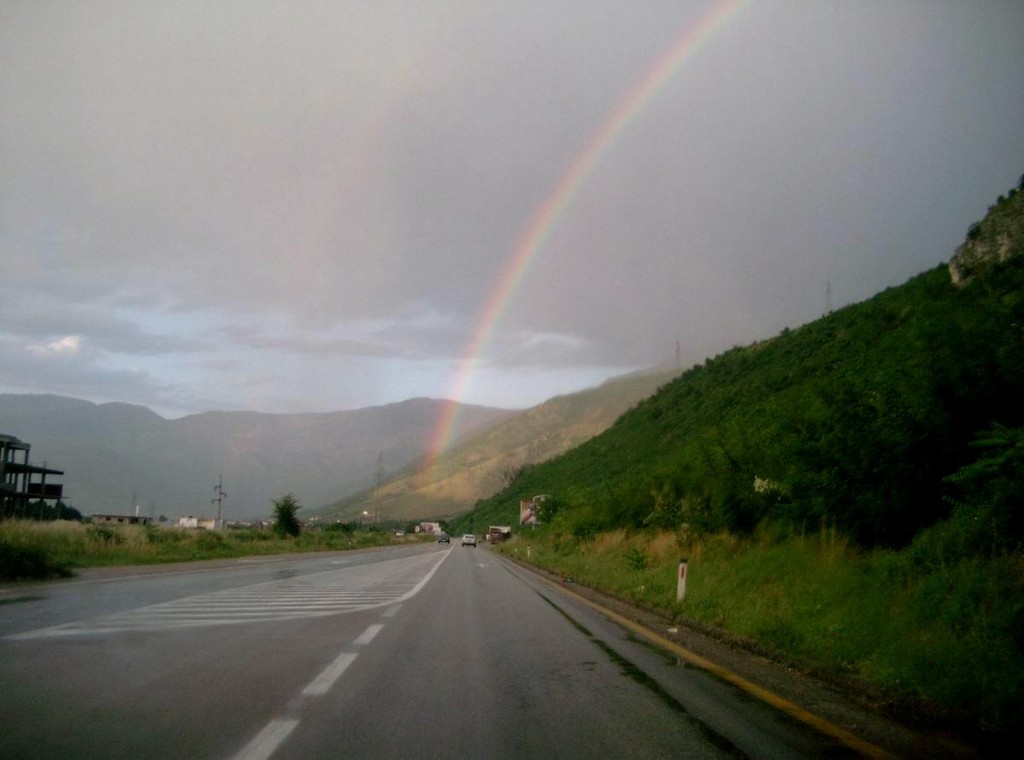Bosnia Herzegovina: Twisted time
Montenegro: A Montenegrin’s moustache
Croatia: They knew everything, and they did nothing
Kosovo: Agreement or +383
Macedonia: One big nothing, nicely wrapped and gaudily decorated
Serbia: Continuity of Endless Disaster
Bosnia Herzegovina: Twisted time
 When it comes to time passing, broadly speaking, there are two ways to look at it. The first is the universally accepted notion of time flowing like a river. That river flows from its source towards its mouth, from the past towards the future. The other notion of time was provided by the English astronomer James Bradley. According to him, time flows backwards: from the future towards the past where the moment when the future becomes the past is called the present. In the context of Bosnia and Herzegovina, we should add another interpretation whereby the flow of time is twisted: one moment we’re living the past, the next moment the future, immediate or far-off; the present is practically non-existent since it would require facing ourselves as we truly are. In that respect, forgive me for not speaking chronologically about Bosnia in 2013 – besides, its inhabitants are averse to anything smacking of logic.
When it comes to time passing, broadly speaking, there are two ways to look at it. The first is the universally accepted notion of time flowing like a river. That river flows from its source towards its mouth, from the past towards the future. The other notion of time was provided by the English astronomer James Bradley. According to him, time flows backwards: from the future towards the past where the moment when the future becomes the past is called the present. In the context of Bosnia and Herzegovina, we should add another interpretation whereby the flow of time is twisted: one moment we’re living the past, the next moment the future, immediate or far-off; the present is practically non-existent since it would require facing ourselves as we truly are. In that respect, forgive me for not speaking chronologically about Bosnia in 2013 – besides, its inhabitants are averse to anything smacking of logic.
The 15 Day Long Year
So, what were we like in 2013? If we look at the majority of ordinary people and their involvement in the public space that would signal their still being members of this society, 2013 was a short year in Bosnia and Herzegovina lasting only about 15 days. It started on October 1st and was over by the 15th. Everything that came before was just preparation for the maddest event of the year, and everything after the 15th is a headache, not a consequence of sobering up, but an interval between two bouts of madness. We are talking about the Population, Households and Dwellings Census in BiH, of course, or rather about Counting the Bosniaks, Croats and Serbs. The national elites that live off of percentages (mathematically speaking: the percentage of the nation in the census combined with the percentage of votes won at the elections equals participation in government; participation in government equals power, and power is used exclusively to pursue personal interests) have already come out with the minimum census results, saying they would not accept anything less. 54% of Bosniaks, 33% of Serbs, 15% of Croats, and 2-3% of others. So, 106% in total. Although for most, the census is meaningless if not expressed in percentages, the fact of the matter is that the census has shown that there are all in all 3.7 million of us, which is at least a few hundred thousand people more than actually live in the country. The fact that this means there is almost one million fewer people here than in 1991, and what happened to all those people, no one seems to care. The census has provided us with the correct sum of incorrect data that will be of little use to anyone.
Everything else more or less bypassed the ordinary people, although it always seems to break their backs. The political scene was characterised by gloomy weather accompanied by intermittent failures of one of the 13 governments in Bosnia and Herzegovina. This astronomical phenomenon of falling governments has been marked since 2012, and it is quite clear that the sky above us will remain in this zodiac sign at least until the next elections in October 2014. In the context of getting over to the other side of the river, 2013 in BiH has, at least so far, been a lousy year. Apart from the sudden and never fully elucidated death of the academician Sulejman Redžić and the quiet and protracted departure of Ilijaz Delić of Mostar, this year has not treated the media in Bosnia and Herzegovina to the departure of a great figure, such as Mirko Kovač in Croatia or Srđa Popović in Serbia. We were, thus, spared the black-and-white front pages with ornate homages and final farewells to my dear friend so-and-so, although in most cases such people died abandoned, misunderstood, long pushed to the margins of society.
The History of BiH in Six Glasses
Tom Standage viewed the history of the entire human race though the drinks that were dominant in a given period and talked about A History of the World in Six Glasses. I sincerely hope that someday someone will view the whole of post-war BiH history through places of protest. Places of protest show the magnitude of helplessness and hopelessness we are mired in. The most powerless, those aware that their protests could not even depose a mayor in a municipality of scarcely a few thousand inhabitants, stage their protests mainly in front of the OHR building[1]. There, in front of a large and powerful enough Goliath, they hope to wheedle what they believe is theirs by right, and even if they don’t get it, they know there is no shame in being defeated by such a powerful opponent. Since mid-October, returnees to the BiH entity of Republika Srpska have been protesting in front of the OHR, asking that the 2002 agreement affording Bosniak returnees the right to a national group of subjects in schools be honoured. From the RS, they initially found justification in the fact that Serbs in the BiH entity of the Federation of BiH do not enjoy the right to a national group of subjects, which the Federal government denied, only to have the Federal Premier issue instructions the very next day for the Serb national group of subjects to be introduced, the same one he had claimed the previous day was already available. As the Greek Prime Minister Mitsotakis said in 1994, “We did not support Karadžić, but we promise not to do it any more.” After that, the RS offered a Solomon solution based on the Stalinist principle of no people – no problems: Goran Mutabdžija, the RS Education Minister asked for the school in Konjević-Polje to be closed down. Just like the RS President demonstrating all the magnitude of the social democratic tradition he fosters when he said he was “seriously thinking about abolishing the Court in Bijeljina” after it had ruled against the RS and in favour of the Lithuanian investors.
Babylution
Those who are completely powerless stage protests in front of the BiH Joint Institutions Building. They are about as powerful as the state of Bosnia and Herzegovina: it exists on paper, but in real life you’d be hard-pressed to find it even with the help of a microscope. This was the site of protests in June by citizens of Sarajevo and other BiH cities after BiH authorities failed to adopt a law on the unique ID number which made it impossible to enter new-borns into the birth registry and issue documents for babies that needed to travel abroad for medical treatment. Following the dramatic blockade of the MPs that were allowed to leave the building only 15 hours later and even that thanks to an intervention of the High Representative Valentin Inzko, everything went downhill. From Banja Luka they said they were all for the babies, but were still more for the RS, while the students of Banja Luka also protesting on the streets of Banja Luka said they had no intention of in any way identifying with the Sarajevo protests. In the end, it all came down like in 1968. Albeit, without Tito and the Kozara ring dance, but with government assurances that the law would be adopted (the temporary order expiring at the end of the year is still in force) and a real party on the last night with some of the most popular local bands. The problem isn’t that this babylution failed, other protests were disastrous on their first attempts, too. The problem is that during those few days, despite the media display, only a few thousand citizens came out protesting, and even they, clearly saying the current situation was no good, failed to offer any sort of alternative. Expanded to the overall situation and the whole of BiH: the problem isn’t that the current situation is bad, the problem is that even the greatest of optimists find it harder to see the end of the tunnel even if we reconcile ourselves to there being no blinding light out there to greet us.
If you don’t jump, you hate Bosnia hehehe
When nothing works out, at least we still have football and the national team. Like opium, or a balm to heal all our wounds, our national team is going to the world cup in Brazil. Now, that’s when the crowds really hit the streets in Sarajevo, waving BiH flags (both current and former), going into a trance watching the Dragons play, forgetting, at least for one night, that they were unemployed, had no health insurance, questionable roofs over their heads, that they could very well be getting a call from the bank tomorrow because they were late with their loan instalment. For the politicians, who charged the state budget for their regular visits to the Dragons’ lair, this success was just the spin they needed.The winner at the 2010 elections and great social democrat demonstrated his love for BiH by disgustingly jumping in a television studio, shouting, “If you don’t jump, you hate Bosnia hehehe”. And somehow managing not to actually jump.
And so, in 2013, we were solemnly silent for days instead of shouting, we solemnly signed arrangements with the IMF as if we were solving all our current and future problems, a mass grave was discovered in the vicinity of Prijedor with over 600 bodies, Momčilo Krajišnik returned as well as a few other convicted heroes, the Sejdić-Finci judgement has remained solemnly unresolved.
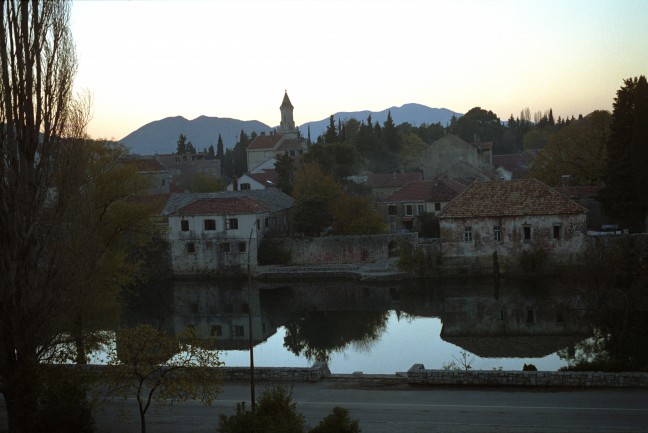
The Sejdić-Finci Centaur
Right, Sejdić-Finci shouldn’t be left out, but explaining it has become exhausting. In brief, the European Court of Human Rights Judgement should allow all citizens of BiH to vote and stand for elections for the Presidency of BiH (according to current constitutional provisions, only Bosniaks, Croats and Serbs are eligible to stand for elections to the Presidency). The EU is threatening with imposing sanctions if the Judgement in not implemented, so our politicians are now trying to figure out how to formally remove discrimination while also resolving the currently evident issue of out-voting of Croats at the state level, but without tampering with the core of the tri-ethnic matrix. Sejdić-Finci (does anyone still remember who Sejdić-Finci are, do we know their names, or have they in fact become conjoined like some sort of newly developed centaur?) has been the subject of hundreds of editorials, academic papers have been written on the subject, reports, etc. Still, allow me to conclude that an ordinary citizen stopped in the street by a reporter and asked about Sejdić-Finci gave the most succinct and complete answer: In any case, they’re screwing around, the four of them (BiH leaders). And they’re fucking with us, because we’re stupid. And that whore, the international community’s helping them out.
If we look at 2013 in the context of reconciliation and facing the past, a few things are worth mentioning. The RS National Assembly adopted a Declaration defining the nature of the war in BiH. According to this Declaration, it was a tragic (as if there were any other kind) civil war and any other interpretation is not just unwelcome, but outright banned. At the same time, a declaration prohibiting the denial of the genocide against Bosniaks in the wider Srebrenica area has not been adopted yet, and the genocide is being constantly and persistently denied by some of the highest officials in RS. Remembering victims is not entirely prohibited, but it is certainly restricted. Local authorities in Prijedor still do not allow visits to the former concentration camps of Keraterm and Omarska; the Višegrad authorities are preparing to tear down the house where in 1992 the Lukić brothers torched 72 civilians, to make way for a local road ten meters wide that can’t possibly take any other route; there is still no memorial to civilian victims killed at Kazani in Sarajevo…
All in all, 2013 in BiH was such that we can’t even use the tired old phrase of surviving to tell the tale. There will be nothing to tell. Those that survive will be repaying loans to the IMF, the World Bank, foreign private banks, domestic (national) leaders and successful private entrepreneurs who are selling us both air and water and our lives on credit.
Nedžad Novalić
Montenegro: Montenegrin’s Moustache
“If anyone ever even touched a hair from a Montenegrin’s moustache, they would be liable to lose their head. Birth and procreation is the only salvation for this people…”
(The day when dealing with peace started causing me too much distress, I abruptly stopped being an activist and became an advisor for tourism and sustainable development (it’s not for nothing that they say “tourism is the passport of peace”, eh!). If this does not bother you, please continue reading my report on Montenegro, a tourist destination. Still, as soon as I decided what I would write about, I felt an ache in my stomach.)
Who (is allowed) to engage in politics?
During a recent training I was conducting, I had the opportunity to ask about 60 people in Montenegro whether they were engaged in politics. Only one of them said yes, and he was a member of a political party. Even the young woman who was a member of a working group developing a law said she was not interested in politics and had nothing to do with it. At a purely technical meeting, after mentioning “improvements to agricultural policy” I was asked “not to use that word”. A few years ago at a workshop, the trainer asked for an example of a right that was most endangered in Montenegro (the question was meant to elicit easy examples, none of those present were involved with human rights or anything along those lines). Three quarters of the responses were identical and when we “disclosed” our notes where we had written down the first thing that popped into our heads, I was shocked to find it was: the right to freedom of speech/expression (?!). We have long known that when you use this right to criticise any phenomenon in society, yourself included, you automatically become an enemy of the state. Apart from that, the government often calls out non-governmental organisations for dealing in politics, or rather for “doing the same as the opposition”. After that, all political parties call upon citizens to turn out for elections, just that, they (the parties) will take care of the rest… those 60 people that changed their minds and are now proud to be doing important things for their country, contributing to improving social, economic, environmental, youth and other policies.
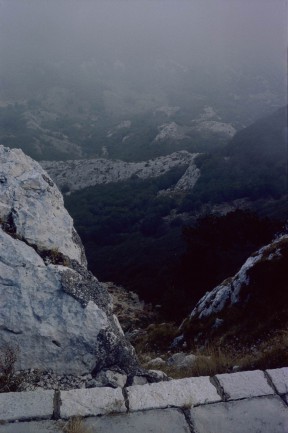
This year we mark 200 years since the birth of Petar II Petrović Njegoš, and his birthday on 13 November will be a new national holiday — Montenegrin Culture Day. This decision was challenged by representatives of the Bosniak party who believe Njegoš inspired hatred towards the world of Islam and that “some of the ideas from his work, interpreted literally, formed the concept and justification for the crimes and genocide against the Muslim population in the 19th and 20th centuries in Montenegro and the region.” Furthermore, Bosniaks believe that at least school textbooks should be purged from contents insulting to Muslims. On the other hand, most admirers of Njegoš say it is necessary to understand the context of his life and work, before we can judge them. During the many months marking the 200th anniversary of his birth, much was said about Njegoš. Excerpts from his life and works are countless and it is just a matter of whether a person/society wants to view them individually or as a whole.
Who is endangered?
As for inequality in society, until recently it was mostly related to gender inequality. However, the list goes on: people on welfare, single parents/mothers, pregnant women and mothers (whose labour rights are endangered), orphans, the long-term unemployed, people from rural areas and the periphery, Roma and Egyptians, displaced persons and refugees, persons with disabilities, LGBT persons… If we were to get into the details, we would have to mention reporters who are definitely a vulnerable group, albeit depending on who they write/speak about and how. Moustachioed Montenegrins are also endangered, and by the LGBT population no less, because the organisers of the Pride Parade chose for their logo — the moustache, the traditional symbol of honour and heroism! The list is not exhaustive, so if you are also endangered, don’t mind, just add yourself to the list!
Why?
Lately, the global economic crisis has been used to explain every problem, so I feel I must point out that the majority of cases of unequal opportunities arose out of the values, attitudes and behaviours in society, and not due to a lack of funds. For example, a number of factors affect the decision of women (not) to enter into politics: influence of the community, historical context and tradition: “a woman’s place is not in politics”; the small number of women in politics and their considerably narrower opportunities for advancement; insufficient moral and practical support from the community; childcare and household work; economic dependence and insufficient female solidarity among women politicians. Individual factors that depend on the women themselves are that they often consider politics a dirty business and are unprepared to put their entire past professional career and integrity on the line. On the other hand, citizens of Montenegro have quite strong preconceptions about women/men in politics, that is to say, the electorate is quite specific and patriarchal. Surveys have shown that half the female respondents believe men would be more successful than women in high level official positions, while only 13-19% of women (depending on the position) believe women would be more successful.
One survey found that the main reason behind unequal employment opportunities for young people is nepotism, but that’s not the end of the story. Nepotism is almost unavoidable in our small country, but real problems arise when you have a host of cousins and friends you’d like to see employed that you simple don’t know where to start, or when you promise both them and their friends jobs right after the next elections and then face a new problem — there are simply not enough jobs to go around.
Lately, I have been extremely irritated by plans of the opposition telling people what they stand to gain if they vote for them, and these are projects they could implement even if they are not in power. Thus we have another vulnerable group — the opposition, who would do anything for Montenegro, we just can’t seem to vote them into office! Either way, both the position and the opposition are prone to scandals, though the “third” (NGO) option is not much better. It seems the current “Recording”[2] scandal will have no end. For me personally it ended when I heard a government representative with a smile (publicly) telling an opposition representative, “Admit it, you’d do the same if you were us”.
The EU is sacrosanct, or the family is sacrosanct, or both(neither)?
I’ve noticed that everything coming from the EU is the best solution for Montenegro. If a solution will help us approximate the EU, it is the right solution. If it has nothing to do with the EU, we’ll smuggle our ideas in as “European”. Thus a few years ago, out of all the recipes from Europe, we decided to adopt the so-called European working hours. In practice, this decision has turned Montenegrin families into ticking time bombs; parents are still unable to match their working hours with daycare and school schedules. Instead of the “old-fashioned” return from work for lunch at 3 p.m., lunch now takes place at fast food grills, children are upset with parents who have no time for them, parents are frustrated for not being able to find the time, space or money for their families. Someone will doubtless say that today’s children are raised by the street, which is true, but it’s also so “European”!
As for the European Union, I admit it’s fortunate to have at least one entity we don’t spin conspiracy theories about when they criticise us. Of course, there are always exceptions.
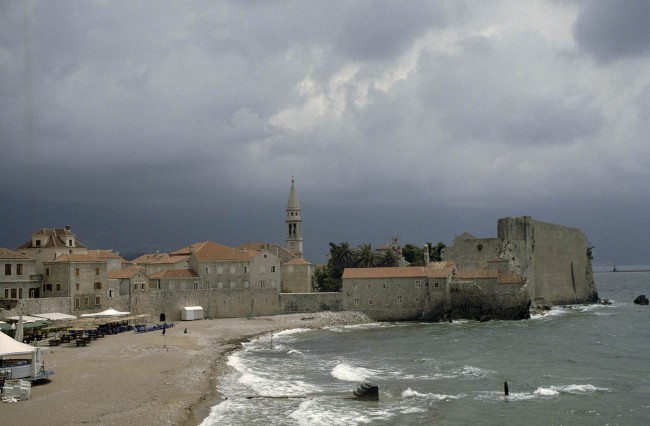
Interesting for the region: Gay is OK?
If Europe says so – of course it is! Good news: two pride parades were held in Montenegro! One more and one less successful. The first was organised in Budva where about a thousand people (which is a large number for such a small place) attacked the participants in the parade with words, stones, bottles and other objects, and the town’s cafe owners hosted a priest who consecrated their establishments as the parade had marched through the square in front. Public opinion was divided — some felt enraged and endangered by the parade, others by the false morality of those who “mind the parade but don’t mind the corruption, organised crime and illegal construction”. I’d really like to know how the latter affects traditional Montenegrin values. Some twenty people were detained, and the organisers were evacuated from the shore to prevent further incidents.
Two months later, the first pride parade in Podgorica was organised, again with ample participation of hooligans, most of them young. This one was successfully implemented, albeit with the inevitable attacks and arrests.
I found it interesting that the vast majority of political parties sent women to support the parade (although it was known they would most likely be exposed to physical violence), and before that the male politicians predominantly identified themselves as not being ‘gay’ or as not being able to picture themselves at ‘such’ parades, but that human rights should be respected, especially since this was important for EU accession (?!). Whatever the reason, the state organised to stand on the side of justice and protected the participants in the parade, both by organising police protection and by sending representatives to support the parade. On the other hand, the Youth Network of an opposition coalition named the “Serb List” called on the citizens of Montenegro to protest, and a representative of New Serb Democracy truthfully said, “We are a conservative Christian party that fosters traditional values. Let the government waving its democracy and European standards support them.” Even the Association of War Veterans from 1990 chimed in saying they “saw it as a provocation” that the date selected for the event was 20 October, “one of the most important dates of the People’s Liberation Struggle when in 1944 the joint forces of the Yugoslav partisans and the Red Army liberated Belgrade from Hitler’s fascists”. On this occasion, the Metropolitan of Montenegro and the Littoral, Amfilohije organised a ceremonial liturgy to “purge the sins the city had been polluted with”. At the solemn academy on the occasion of the consecration of the Cathedral that “this house of worship is a call to forgiveness and reconciliation in Montenegro,” which apparently did not apply to him since he spent days calling for hatred and resistance to the “shameless parade proclaiming sin to be a virtue and misanthropy to be philanthropy.” Citizens interviewed on the street parroted his words about how we were created to procreate and how the family must be defended from those that would destroy it, and they were particularly angered by the (above mentioned) moustache.
The magnitude of the violence and hatred issuing from the young people who made up the majority of the assembled hooligans, a third of them under-age, was shocking. One boy from Podgorica suffered third-degree burns from an explosive device he had made himself following a “recipe” from the internet and planned to activate at the parade.
At the end, let us return to my profession (tourism!) in the context of LGBT rights. Only a few days after the Pride Parade in Budva, exactly 30 km away, at Kotor, 2.800 homosexuals disembarked from a cruiser:
The Director of the local tourism organisation Mirza Krcić, who we found in the town, told the “News” that everything was going smoothly, there were no problems, and that the people of Kotor showed themselves to be dignified.
“Everyone should express their opinions and choices, and people should respect that. The citizens of Kotor have proven their dignity and that they respect differences and that everything would be fine. Everyone is welcome in Kotor, everyone whose freedoms that do not endanger others, and in my opinion, it’s all legitimate. We should let people think and feel however they want to think and feel, and that should be respected, everyone’s opinion and choice. This is normal everywhere in the world. Yesterday, they visited Dubrovnik, and the people of Dubrovnik say they’re big spenders,” Krcić said, noting that he was personally more interested and concerned about what would happen with the Montenegro budget or the Aluminium Conglomerate (which is being shut down) than about having 2800 gay people in Kotor.
Lidija Brnović
Croatia: They knew everything, and they did nothing
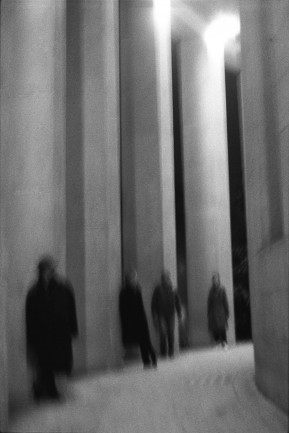
The greatest change to happen in Croatia in the past year was accession to the European Union. With a lot of settled accounts and measures to impose fiscal order on the “wasteful” state, there were some instances for exercising state sovereignty, such as the dispute with the EU concerning the law that became popularly known as Lex Perković after the former UDBA (Yugoslav secret police) agent accused in Germany for the murder of the political emigrant Stjepan Đureković. It is hard to imagine there are many people who understand what the dispute is about and what makes this piece of legislation worth risking sanctions over upon entry into the “European family”. However, this was also an opportunity for us to re-examine the state of Croatian media, the impossibility of discerning any meaningful information in the cacophony of potential threats and insinuations. Also, though we have yet to see it (notwithstanding the long period of negotiations), it is possible to negotiate once your position is at least nominally equal to those setting the conditions. It is possible to act in the capacity of the state, and it is a shame that such actions are limited to individual acts of the EU acquis. Although the Premier contends this is a principled standpoint, the whole mess has done nothing to help shed light on the recent Croatian past and the way the secret services (or individual agents) influenced the emergence of Croatian independence.
According to Premier Milanović addressing the Parliament on the “state of the nation”, in the 22 years of its independence, Croatia has achieved all its strategic political aims, including NATO and EU membership. Apart from that, he also announced a new wave of privatisation of the remaining state-owned enterprises due to the necessity of consolidating the state budget[3]. So, apart from political strategic aims, in the 22 years of its independence, Croatia has also managed to sell off its state-owned property, the economy is still dysfunctional, and the citizens, as well as the state itself, find themselves enslaved by debt. The GDP is still on the decrease, 70 thousand workers are not being paid, and there are 314 000 unemployed people, or 18%.
EU accession also determined the border between Croatia and its Balkan neighbours, so this year was again marked by regression in cross-border communication in the literal sense, failing to arrange for our neighbours what Croatia had enjoyed in the years of Slovenian EU membership – crossing the border with personal ID cards.
The fact that the border is not merely territorial became clear when the government attempted to ensure the implementation of Croatian laws on the entire territory of the state, including areas of special state concern (areas destroyed during the last war). However, although “bilingual” (Latin plus Cyrillic script) plaques were affixed to buildings of state institutions in Udbina, in Lika, the same task turned out to be far more difficult to carry out in Vukovar. The same morning when they were put up, under police protection, they were smashed in a destructive campaign the police was helpless to stop to such an extent that the new plaque was torn off the building of the police station itself. The HDZ that had enabled the passing of the Constitutional Law on the Rights of National Minorities four years ago is now vehemently opposed to its implementation[4] and is demanding that Vukovar be proclaimed a “city of special piety”. In this concrete case, that would mean legalising the suspension of Croatian laws on a piece of Croatian territory.
What is more irritating than the cynical attitude of the former government is the standpoint of the current government. Namely, to defend the law, SDP keeps pointing out the pivotal responsibility of HDZ, while they as good, civic-minded legalists are “merely” trying to implement what is stipulated by the constitutional law. Even if we could resist the feeling that politicians across the Croatian political spectrum treat this law like an unwanted child, what is even more worrisome is the possible ideological background to this defence. Defending the law in the Croatian Parliament, the Premier said, “This law is triumph for Croatia. We must be generous in victory and act in good faith in peacetime.”
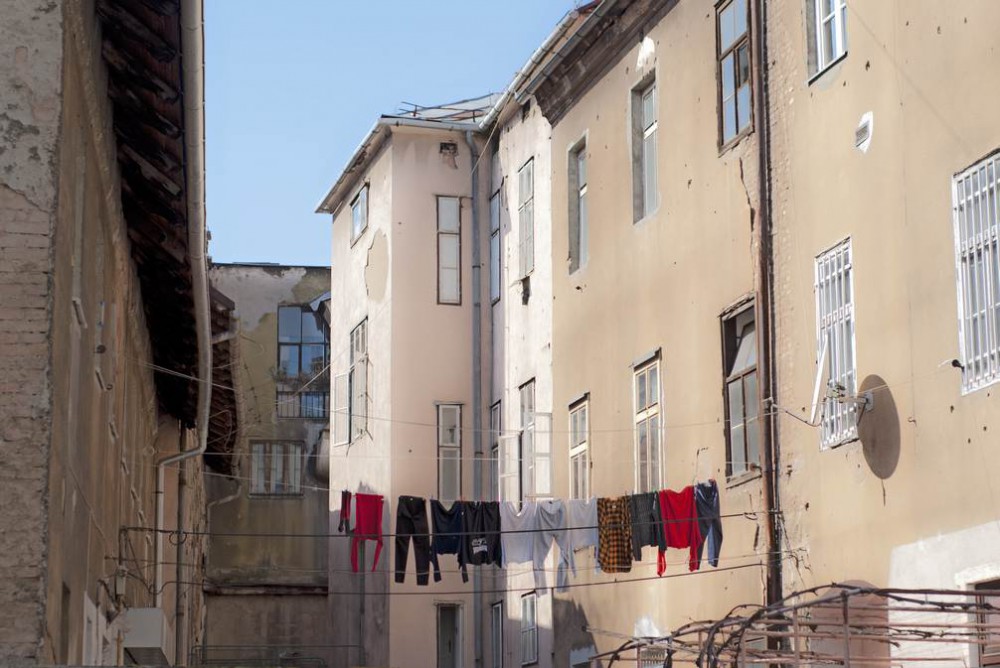 It is not entirely clear what this good faith consists of or why it is deemed necessary. Few would be apt to ask about the “victory”. The official “victorious” discourse on the nature of the Homeland War has become so dominant in public space that the Premier was quick to wash his hands when he once openly contemplated the multifaceted nature of this conflict, quite recklessly uttering the phrase “civil war”. The danger of cementing this state of affairs is illustrated by an “anecdote” related to scholarly research, specifically history. Thanks to a request submitted by the young scholar Julijana Antić Brautović doing research for her doctoral dissertation on the “trade” in territory between the Republic of Croatia, the Republic of Yugoslavia and Bosnia and Herzegovina (Prevlaka and the eastern part of Konavle), asking for access to classified information from the Tuđman archives (now stored at the State Archives), we found out that access to such documents is granted only to individuals with security clearance, which in turn is decided upon by the government and its committee at a closed session. Perhaps such restriction of access to state documents still under the 30-year confidentiality rule would not be unusual if it had not turned out that Ante Nazor, Director of the Croatian Homeland War Memorial Documentation Centre, has security clearance and access to the documents. The explanation is that the government founded the Centre and tasked it with “researching the truth about the Homeland War”. What remains unanswered is how such “truth” can be researched when the government (with the help of the intelligence community) determines not only who has access to such documents, but also what is relevant for such research.
It is not entirely clear what this good faith consists of or why it is deemed necessary. Few would be apt to ask about the “victory”. The official “victorious” discourse on the nature of the Homeland War has become so dominant in public space that the Premier was quick to wash his hands when he once openly contemplated the multifaceted nature of this conflict, quite recklessly uttering the phrase “civil war”. The danger of cementing this state of affairs is illustrated by an “anecdote” related to scholarly research, specifically history. Thanks to a request submitted by the young scholar Julijana Antić Brautović doing research for her doctoral dissertation on the “trade” in territory between the Republic of Croatia, the Republic of Yugoslavia and Bosnia and Herzegovina (Prevlaka and the eastern part of Konavle), asking for access to classified information from the Tuđman archives (now stored at the State Archives), we found out that access to such documents is granted only to individuals with security clearance, which in turn is decided upon by the government and its committee at a closed session. Perhaps such restriction of access to state documents still under the 30-year confidentiality rule would not be unusual if it had not turned out that Ante Nazor, Director of the Croatian Homeland War Memorial Documentation Centre, has security clearance and access to the documents. The explanation is that the government founded the Centre and tasked it with “researching the truth about the Homeland War”. What remains unanswered is how such “truth” can be researched when the government (with the help of the intelligence community) determines not only who has access to such documents, but also what is relevant for such research.
That this treatment is not an isolated incident is made clear by the announcement issued by the minister for veterans Fred Matić that the government is planning to introduce Homeland War topics into school curricula through experimental teaching that would include, in the first place, a field trip to Vukovar[5]. School curricula would also include as mandatory at least one annual visit to a battleground closest to the location of the school. In practice, this means that children from Zadar would go to Maslenica, but no one asked the minister whether this also means children from Split would visit the Lora wartime port. It would hardly be appropriate to tell schoolchildren about the beatings and humiliations that took place at Lora where people were brought under accusations of having participated in preparing an armed uprising against Croatia that could rarely be substantiated by material evidence. On the declarative side, the state never recognised these crimes. On the other hand, some of the victims settled out of court and were paid compensation. Still, it is hard to believe there would be room for a story like this in the education system. In addition, the ministry for veterans has published a call for proposals from non-profit organisations “whose primary activities deal with protecting the interests and caring for Croatian defenders and victims of the Homeland War.” Five million Kunas have been set aside for this purpose, and it is intended to promote the values of the Homeland War.
All of this was determined by the acquittals of Croatian generals Markač and Gotovina received in their homeland with righteous enthusiasm untainted by the above “sporadic” incidents. The latter, Ante Gotovina, was made honorary citizen of Split at a ceremony attended by the minister most mentioned in this report as well as two of his colleagues from the government. A note of dissonance was introduced into this Croatian story of victory and righteousness by the first-instance ICTY judgement against the Herzegovinian six. The former political and military leaders of the self-proclaimed “Herceg-Bosna” were found guilty of a joint criminal endeavour to expel and kill Bosniaks in Bosnia and Herzegovina. According to the judgement, Franjo Tuđman coordinated the criminal endeavour with the ultimate aim of “annexing” this part of Bosnian-Herzegovinian territory to Croatia. The Trial Chamber found that the conflict was international in character, denoting Croatia as an aggressor in relation to BiH. The appeal process is currently under way, and given some recent unusual practices at the Tribunal, the outcome seems uncertain.
Following the acquittal of Gotovina and Makrač, both Premier Milanović and President Josipović stated that crimes committed during operation “Oluja” should be prosecuted. We should also add that Croatia needs to distance itself from the heritage of Franjo Tuđman whose government covered up war crimes, prevented their prosecution and conducted a policy to prevent the return of Serb refugees. So that one day history itself would not judge us for doing what was so aptly stated in the first-instance judgement against Jadranko Prlić, Bruno Stojić, Slobodan Praljak, Milivoje Petković, Valentin Ćorić and Berislav Pušić: “They knew everything, and they did nothing.”
Davorka Turk
Kosovo: Agreement or +383
The most important event in terms of the future cooperation between Kosovo and Serbia was the signing of the AGREEMENT in April 2013. This was an important topic much discussed in the public, but the details are still being negotiated with the mediation of the European Union and Lady Catherine Ashton.
This intensive dialogue is of significance not just for the two countries involved, but for Europe and the wider world. All the conflicts in the world, wars, disputes, etc. were ultimately resolved through dialogue, something that is at the core of this Agreement.
Some of the more interesting topics of the dialogue are still open, including the issue of the Telecom company and energy policy. The Kosovo authorities have requested that the country code of +383 be assigned to Kosovo, but the Serbian government has refused the request.
The dialogue has shown that there are problems in reaching compromises on both sides, and that certain particularities of the agreement are differently interpreted, whereby each side uses the interpretation to sway matters in the direction of its unilateral interest.
The elections are another important topic in the Agreement. Citizens in the north of Kosovo did not participate in the previously held elections, so the premiers of both countries, with EU mediation, agreed to have elections on 3rd November in the entire territory of Kosovo, including the north (Severna Mitrovica, Zvečan, Leposavić, Zubin Potok). Members of the Serb community had boycotted the previous elections fearing the government would be made up exclusively of Kosovo Albanians. They also did not participate in the local or parliamentary elections despite there being reserved seats for Serbs in the Kosovo Parliament. However, in contrast to what happened in the past, it seems they will participate in the upcoming elections. Ten Serb parties have already registered with the Central Elections Committee. [6]
Apart from this, the constant major problems faced by all citizens of Kosovo are: lack of freedom of movement, high unemployment (mostly among the 18-30 age group), privatisation of major public enterprises (Telecom and energy complex), widespread corruption, and constant incidents and violence (such as the murder of the EULEX police officer).
All of this has been keeping the inhabitants of Kosovo in a state of elevated tensions for years, making them fear the future, new outbreaks of violence, and is not conducive to stabilisation and peace-building in the region.
One positive event took place at the end of September when Mitrovica hosted the First Youth Conference of the Cities in Transition Forum. Youth representatives from Belfast, Derry-Londonderry, Jerusalem, Kaduna, Ramallah, Tripoli and their hosts from Mitrovica exchanged experience from their locations and compared similarities they share.[7]
One of the main conclusions of this exchange was the necessity for communication between different people, the necessity of strengthening communication between the Kosovo Serbs and Kosovo Albanians, and members of other communities present in Kosovo. The significance of this event lies in its rarity, especially in Mitrovica, so the media devoted considerable attention to this meeting of young people and the strengthening of links between them. We hope that this will encourage the establishment of more organisations working to improve ethnic relations and events foregrounding these relations, and that the work of existing organisations will become more visible to the public.
Lulzim Hakaj
Maceodnia: One Big Nothing, Nicely Wrapped and Gaudily Decorated
As I type this, the TV is showing live coverage of the first Sahara Balkan Peace Festival organised by the company
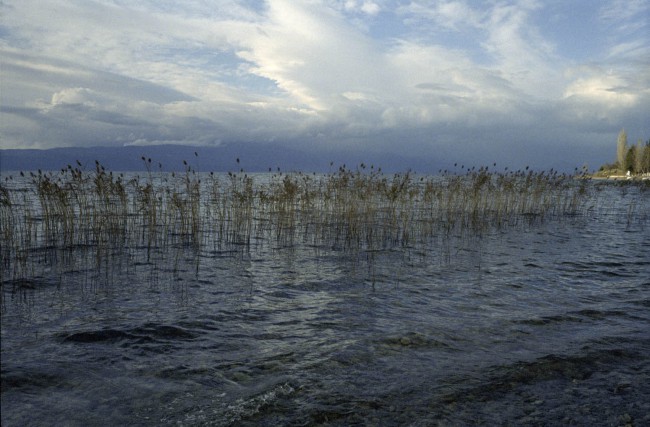 of the Indian billionaire Subrata Roy and under the patronage of the Macedonian Government. The state elite, all decked out in formal attire, was just addressed by the most expensive speaker of the day, Tony Blair, and just before him Nikola Gruevski. I’m waiting to see who gets the Champion of Peace prize. Gandhi and Mother Theresa get quoted all over the place. What is this about? I don’t know whether to laugh, fume with rage or be frightened. Namely, the Indian billionaire who appeared in Macedonia early this year was presented bombastically by the government as a great investor taking over cattle raising in the east of the country, investing millions in the construction of a luxury resort on Lake Ohrid and, of course, erecting the grandiose monument of Mother Theresa in Skopje’s main square. He is wanted in India due to a final court decision that found he had cheated hundreds of people for payments of over 4 billion dollars. Few show any concern while his investment plans are publicly glorified.
of the Indian billionaire Subrata Roy and under the patronage of the Macedonian Government. The state elite, all decked out in formal attire, was just addressed by the most expensive speaker of the day, Tony Blair, and just before him Nikola Gruevski. I’m waiting to see who gets the Champion of Peace prize. Gandhi and Mother Theresa get quoted all over the place. What is this about? I don’t know whether to laugh, fume with rage or be frightened. Namely, the Indian billionaire who appeared in Macedonia early this year was presented bombastically by the government as a great investor taking over cattle raising in the east of the country, investing millions in the construction of a luxury resort on Lake Ohrid and, of course, erecting the grandiose monument of Mother Theresa in Skopje’s main square. He is wanted in India due to a final court decision that found he had cheated hundreds of people for payments of over 4 billion dollars. Few show any concern while his investment plans are publicly glorified.
And now, here he is organising no less than a Balkan Peace Festival. Who else from the region is in attendance? No one, of course. Why in Macedonia? He explained it nicely yesterday, he said that for years he had nurtured this idea and was looking for a country where it could be implemented, a country of peace, love, a country without corruption. And finally, he found it. This is not a joke. I am not joking in the least.
Last year, Macedonia was marked by a severe conflict between the government and the opposition. We have been living this tension for a few years, but now the conflict has overtaken literally everything. All social processes have been subsumed under this settlement of accounts, or they are completely ignored. The conflict culminated on 24 December 2012. In the midst of a heated debate about the new state budget, the government to respond to the filibastering[8] of the opposition by bringing the secret police into the Parliament to physically remove the entirety of opposition members. That was ten minutes after they had removed members of the press from the gallery. For security reasons, they said. Videos of the brutal expulsion of MPs from the parliament were, I believe, seen throughout the region. At the same time, the opposition had a few thousand protesters in front of the Parliament, which incited the government to assemble the same number of its own supporters. In both cases “the people happened”. So they say. (And what happened to the people?) The risky situation in the streets passed without major incidents. For the next months, the opposition boycotted the work of the Parliament, protested in the streets of cities and ultimately accepted participating in the local elections with significant involvement of EU mediators and on the condition that a committee be formed to report on legal violations in parliamentary practice on that day. The elections were mostly won by the ruling parties, and a comment regarding the conclusions of the committee was given by one of the participants, MP Ilija Dimovski, who likened the significance given to the report to that given a box of Kleenex. Either way, the report has been issued, noted remarks regarding the procedure are now waiting to become operational. A bitter aftertaste is left by the fact that almost all documents following the large-scale skirmishes in the country were produced with strong mediation by outsiders, mainly people from Brussels or Washington.
Another important event in my opinion was the absurd arrest of reporter Tomislav Kežarovski from Veles (special police in full gear, early morning, cameras…). The ludicrous charges were that an article he published in 2008 had revealed the identity of a protected witness in a murder case. Information known to the public indicate that the man did not have the status of a protected witness until the next year, and a little later he himself publicly admitted that police inspectors had coerced him into giving false testimony against someone accused of murder. In the meantime, Tomislav Kežarovski’s detention was extended five (!) times. In response to pressures from international (they have long since ceased paying attention to national) press and other associations, the government said they did not interfere with the work of the courts and, besides, the trial would begin soon, and a verdict would closely follow.
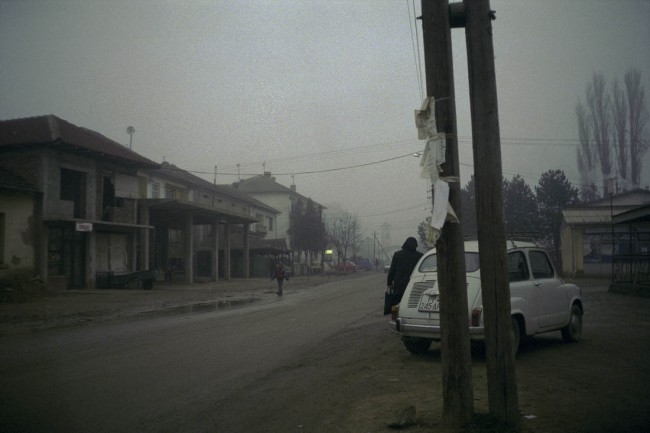
Macedonia has dropped another 22 places in the Reporters without Borders report on freedom of the media, and in 2013 it occupied position 116.
There were no significant developments in the field of inter-ethnic relations. The general policy – each to (rule) his own – continues. Ethnic homogenisation and physical segregation continue with intermittent disruptions holing up the trend. In my opinion, this is the worst course for Macedonia since, in combination with the general climate of lack of understanding for different opinions, it does not promise a good outcome. A few months ago I participated in a discussion in Tetovo. A discussion among people who were all practically of the same opinion there was a strong undercurrent of discounting who was what. Implying that ethnic and religious identities were unimportant. Come now, who cares about what you are, that is unimportant. I argued that it was important, that people here were in constant conflict along these lines, that we have a long history of conflicts, that, after all, the war happened along the same lines, and that the identities set up in opposition to one another should be examined, not ignored. I still have this dilemma. How far should we take the respect for the needs and ambitions of these identities. Is there an end to such ambitions, a point where they are finally realised, not endangered, where “enough now, we’ve made it, let’s go on”. Is that point the 30 meter tall statue of Alexander the Great of Macedonia in the centre of Skopje or the 50 meter long Albanian flag along the motorways in the west of the country? Where is that point? Does it even exist?
Yes, there are some other small points in time and space where we can openly and amicably discuss important matters to do with us. Outside the media and public eye. It’s probably better that way.
Public debate, critical thinking and contextualising events have all but disappeared. Everything boils down to uniform propaganda. It goes so far as completely creating an event to be distributed. Such as the Balkan Regional Peace Festival without anyone from the region in attendance, organised by a billionaire from India, with Tony Blair as the keynote speaker, and with dance groups from India dramatising Gandhi’s revolt against the gilded stage of the new 45-million-Euro theatre. One big nothing, nicely wrapped and gaudily decorated. A completely new level of manipulation. Oh, right, the Champion of Peace for this year is Jeremy Gilley from Peace One Day. During his acceptance speech he said he could not believe he received the prize. I can’t believe it, either. I can’t wait to see which company will be organising peace festivals for us next year. Coca Cola, perhaps?
Boro Kitanoski
Serbia: Continuity of Endless Disaster
Following the signing of the Brussels Agreement two months earlier, with which it took on the obligation to abolish parallel structures in the north of Kosovo and regulate relations with Kosovo, in June 2013, Serbia received assurances that negotiations on accession to the European Union would begin in January 2014. The response was less than EUphoric. Unsurprisingly, since it is quite unclear (at least to the public) what this Europe should mean[9]. In the discourse of the domestic political elite, European standards and European integration mainly function as a wild cards devoid of meaning and therefore convenient as receptacles for a wide variety of meanings depending on the requirements of the occasion or speaker. Most frequently as promises of access to the welfare and social security of First World citizens or as a justification of things “we’d rather not, but Europe says we have to”. And that Europe, except perhaps superficially, is asking for less and less. Apart from the implementation of the Brussels Agreement and control of asylum seekers. Nothing superficial about that.
The signing of the Brussels Agreement did not give rise to any major shifts in Serbia. Kosovo has long played the McGuffin[10], here, and the film is dragging on. Constant insecurity and fear of the pervasive violence and what the future will bring 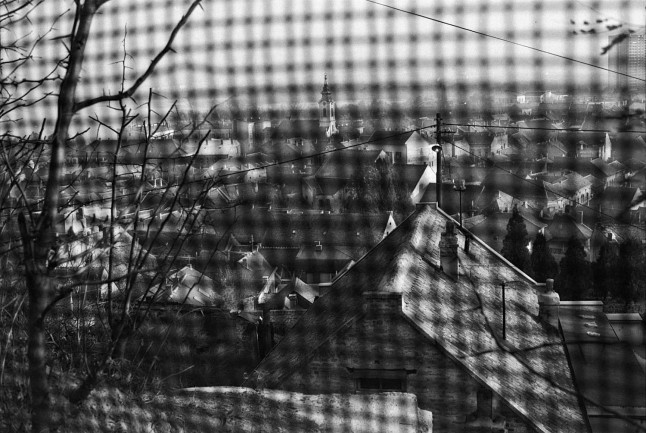 makes up the everyday lives of most of Serbia’s population. By many indicators, Serbia is among the poorest countries in Europe, with more than a million unemployed, where desperate people are increasingly driven to chopping off their fingers, hammering nails into their hands or self-immolation, because “ordinary” hunger strikes no longer draw enough attention. There are no widespread protests, nor are they expected. The desperation is individual, inarticulate, and solidarity goes no further than isolated protests by groups of co-sufferers that find themselves in the same situation. Kosovo is no exception. Apart from a gathering of a few thousand people at the Square of the Republic on 10 May – organised by the Serbs from Kosovo, and memorable mostly due to the “liturgy” for laying to rest of the Government and Parliament led by the Montenegrin and Littoral Metropolitan Amfilohije, and the comparison of Dačić with the assassinated Premier Đinđić (“Dačić says he is interested in earthly, not heavenly politics. Đinđić spoke that way, too, and how he ended up, Lord knows.” – Bishop Atanasije[11]), not much else has happened. Harsh reaction from almost all the political parties and the public to what was said and the swift distancing of Patriarch Irinej of the Serb Orthodox Church from the events served as a remainder that the Church’s power in the public space is derived from the will of the political elites.
makes up the everyday lives of most of Serbia’s population. By many indicators, Serbia is among the poorest countries in Europe, with more than a million unemployed, where desperate people are increasingly driven to chopping off their fingers, hammering nails into their hands or self-immolation, because “ordinary” hunger strikes no longer draw enough attention. There are no widespread protests, nor are they expected. The desperation is individual, inarticulate, and solidarity goes no further than isolated protests by groups of co-sufferers that find themselves in the same situation. Kosovo is no exception. Apart from a gathering of a few thousand people at the Square of the Republic on 10 May – organised by the Serbs from Kosovo, and memorable mostly due to the “liturgy” for laying to rest of the Government and Parliament led by the Montenegrin and Littoral Metropolitan Amfilohije, and the comparison of Dačić with the assassinated Premier Đinđić (“Dačić says he is interested in earthly, not heavenly politics. Đinđić spoke that way, too, and how he ended up, Lord knows.” – Bishop Atanasije[11]), not much else has happened. Harsh reaction from almost all the political parties and the public to what was said and the swift distancing of Patriarch Irinej of the Serb Orthodox Church from the events served as a remainder that the Church’s power in the public space is derived from the will of the political elites.
The departure of the Democratic Party (Demokratska stranka – DS) and the arrival of the Serbian Progressive Party (Srpska napredna stranka – SNS) brought in some changes, but nothing fundamental has changed. There was no radical turnabout compared to the politics of the Democratic Party. The European course, reducing democracy to periodic elections every four years, employment based on party and family affiliation[12], the dominance of the executive over the judicial and legislative branch of government, the lack of division of government and mutual control of the various branches, paying lip-service to the sanctity of human rights without a genuine effort to uphold and/or protect them make up this continuity. There are some novelties, however. One is that from the superficial advocating of fighting corruption in political shows, the media have started announcing arrests of tycoons. Miroslav Mišković, the top fat cat from the 1990s, was arrested under corruption charges. Part of the system that enables and induces corruption has not been dismantled (yet?). But that’s hardly important as long as the ratings are kept up. And they are. People like to see nothing better than a rich man in jail.
Whether he positions himself as a defender of the robbed and humiliated, or the man to sacrifice himself for the modernisation of Serbia, and/or the embodiment of the will of the people, Aleksandar Vučić is currently the most popular politician in Serbia. His popularity is reflective of a deeper continuity of desire for “someone who knows how”, “someone who will solve things (himself?)”, “someone different”, shared to a greater or lesser degree by all strata of society. In that respect, ideology mostly serves a decorative purpose. At the same time, a particular combination of “proven patriotism” and pro-European modernist rhetoric offsets criticism and affords Vučić widespread support both from traditional voters of the (formerly) Serb Radical Party and a sizeable portion of those who vote for what was once known as the pro-democratic block. Not only did his radical political about-face from-Šešelj-to-Weber leave his popularity unscathed, if anything — his popularity increased. And SNS is seen as a party that keeps its promises[13].
On the other side is the disoriented opposition, primarily the Democratic Party, which, following the replacement of Boris Tadić, deals with constantly decreasing ratings by accusing “its” voters of disloyalty and/or misunderstanding and inner-party fractioning. The previously introduced practice of having local authorities harmonise with state-level government is returning to the Democratic Party like a boomerang. The DS President Dragan Đilas was deposed from the position of Mayor of Belgrade and new elections will be held in the capital. Local and central government concur almost throughout the country, which once again opens up many questions. For example, if power relations at the central level of the Republic (or the level of the President) are to be replicated at other levels of government, what exactly is the point of local elections? Or, rather, what would be the consequences of concentrating power in the hands of such a small number of people? Still, questions are something we’ve always had more than enough of. And these are not exactly new questions.
It is also not particularly novel to ban the Pride Parade, something that almost metaphorically sublimates the various forms of continuous lack of accountability and/or cynicism of the political class in Serbia. It has been banned for the third time for “security reasons”. There is one aspect where statements of politicians from ruling structures leave us no room for disagreement – namely, that this is not a defeat for the state. For the state to be defeated, it would have to stand by its Constitution and its laws and try to ensure their implementation. Without resorting to relativism, personal dis/likes and hiding behind thugs, extreme right and hooligan groups (who when it came to the signing of the Brussels Agreement, a potentially far more risky event, were apparently all off on a fishing holiday somewhere). That would be the core of the frequently used phrase “rule of law”. One of the purposes of the Constitution, laws and institutions is the restriction of authority, its effective control and the prevention of arbitrary rule. Max Weber, a favourite thinker of the first Vice-President of the Government of the Republic of Serbia, Aleksandar Vučić[14], had much to say about it, and with great passion. Without it, we enter what Serbian Newspeak calls “political will”, a grey zone conducive to judicial processes running into obsolescence, tycoons connected to the government robbing state-owned and racketeering private enterprises, murders of reporters remaining unsolved and milk with unacceptable levels of aflatoxins being proclaimed perfectly healthy. The list could conceivably go on forever. And much has already been seen.
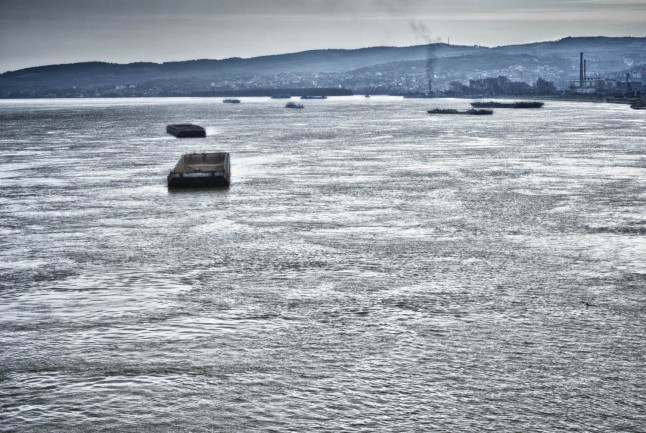 Last year’s change of government and the coming to power of those who had had a significant role in shaping the last decade of the 20th century in this region did not bring about any sort of “return to the 1990s”. The social amnesia that enshrouds the 1990s in Serbia and according to which “Serbia was not involved in the war” has in time come closer to “What war?”. Leaders of the Democratic Party have contributed to this amnesia through their lack of political vision and/or courage to open up the question of Serbia’s responsibility for these wars, the question of their consequences, but also their failure to, on behalf of the country they represented, express remorse without relativism and send an unambiguous message to others (in the region and in the country) that something like that would not be repeated. It is then not inconceivable for the regime personified by Milošević to become merely “a government that was not ideal, given that it lost the elections”, but “all that should be left in the past” because “if we cannot correct the past, we can influence the present and the future” (Ivica Dačić)[15]. However, that past is present, issuing daily warnings that it’s not going anywhere. Either in the guise of seemingly incomprehensible eruptions of violence such as the multiple murder in Velika Ivanča near Mladenovac where a man described by his neighbours as quiet and good (otherwise a war veteran from Slavonija in 1991) killed thirteen people in their sleep[16]. Or the recent incident of primary school pupils beating up their teacher while he waited for his wife and child in the park[17]. Or in the selective history, simplified black-and-white explanations and/or discourses of self-victimisation whereby “we are, if not the only, then the greatest victims” still dominating public space in relation to the wars of the 1990s. Desperation and frustration coupled with normalised violence make for a dangerous combination, and the past is never just the past. This kind of past lasts forever.
Last year’s change of government and the coming to power of those who had had a significant role in shaping the last decade of the 20th century in this region did not bring about any sort of “return to the 1990s”. The social amnesia that enshrouds the 1990s in Serbia and according to which “Serbia was not involved in the war” has in time come closer to “What war?”. Leaders of the Democratic Party have contributed to this amnesia through their lack of political vision and/or courage to open up the question of Serbia’s responsibility for these wars, the question of their consequences, but also their failure to, on behalf of the country they represented, express remorse without relativism and send an unambiguous message to others (in the region and in the country) that something like that would not be repeated. It is then not inconceivable for the regime personified by Milošević to become merely “a government that was not ideal, given that it lost the elections”, but “all that should be left in the past” because “if we cannot correct the past, we can influence the present and the future” (Ivica Dačić)[15]. However, that past is present, issuing daily warnings that it’s not going anywhere. Either in the guise of seemingly incomprehensible eruptions of violence such as the multiple murder in Velika Ivanča near Mladenovac where a man described by his neighbours as quiet and good (otherwise a war veteran from Slavonija in 1991) killed thirteen people in their sleep[16]. Or the recent incident of primary school pupils beating up their teacher while he waited for his wife and child in the park[17]. Or in the selective history, simplified black-and-white explanations and/or discourses of self-victimisation whereby “we are, if not the only, then the greatest victims” still dominating public space in relation to the wars of the 1990s. Desperation and frustration coupled with normalised violence make for a dangerous combination, and the past is never just the past. This kind of past lasts forever.
Swimming between the narrative of lost identity, the betrayal of Kosovo and nationalist ressentiment, and the (failing) hope of a golden age (personified in the prosperity of the EU), the shipwrecked inhabitants of Serbia wait for a boat to save them from floating in endless disaster. The bad news is that we should not expect much in the way of help from the outside, and that the people living here will have to row themselves ashore. That’s also the good news.
Marijana Stojčić
[1] Office of the High Representative in Bosnia and Herzegovina
[2] Audio recordings have been leaked to the public from a meeting of the ruling Montenegrin party DPS where its representatives openly discuss employment along party lines, changes to the voters list, and directors of state companies that work exclusively in the interests of the party.
[3] Croatia Osiguranje, Croatia Airlines, ACI, highway monetisation, after this government already did the same with the sale of Brodosplit, Brodotrogir and Treći maj (shipyards) and the concession of the Zagreb Airport
[4] The former state administration minister in HDZ’s government said on a TV show, “When HDZ was in favour of Cyrillic, there were not enough Serbs in Vukovar to make them eligible for official use of language and script.” This pertains to the percentage of the Serb minority in the population that would make bilingualism in social and public life and official communication in public affairs mandatory.
[5] “Every day, not counting the summer holidays and weekends, Vukovar would greet a dozen buses with schoolchildren. They would sleep in the barracks on army cots, and would attend organised history classes taught by professionals from among the veterans or young historians trained by real veterans. They would visit all the important sites in the town, but also its periphery if they wish, from Ilok to Kopački rit. The final lecture would be held at the Peace Centre so that everyone would be leaving Vukovar with messages of peace.”
[6] Data from the end of September 2013, at the time of writing.
[8] Filibustering is a parliamentary procedure whereby debate on a proposal is dragged out and where one or more MPs can postpone or completely hinder voting on the proposal. je parlamentarna procedura kojom se rasprava o nekom predlogu prolongira, čime jedan ili više članova parlamenta mogu da odlože ili u potpunosti spreče glasanje o određenom predlogu.
[9] To što tu konfuziju u značajnoj meri dele i zemlje Evropske Unije, ne olakšava, već dodatno otežava stvar.
[10] Mekgafin (McGuffin) je termin koji je uveo Alfred Hičkok i označava postupak građenja čitave priče u filmu oko jednog motiva koji se svuda provlači, pokreće likove na akciju i prati priču, a suštinski je nebitan za gledaoca. Funkcija tog motiva je da gledaoca stalno drži u neizvesnosti i napetosti.
[11] Srbin. Info – Srpske brze internet novine, 2013, http://srbin.info/2013/05/mitropolit-amfilohije-sluzio-opelo-za-upokojenje-vlade-srbije/
[12] According to the Policy Centre as reported by the daily Blic, the current government has deposed almost 3000 people in the state administration, while in the last year it employed another 3000 people along party lines in public services. Source: Blic online, 2013, http://www.blic.rs/Vesti/Politika/380172/Vlada-do-sada-smenila-3000-ljudi
[13] Politika, 2013, http://www.politika.rs/rubrike/Politika/SNS-sam-na-vrhu.sr.html
[14] TV B92, 2013,
[15] Akter, 2013, http://akter.co.rs/25-politika/54434-hvala-im-to-su-nas-smenili-oktobra-2000-godine.html
[16] Glas Amerike, 2013, http://www.glasamerike.net/content/masakr-kod-mladenovca/1637770.html
